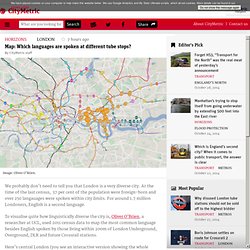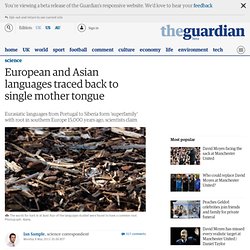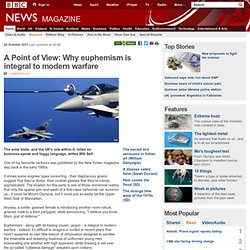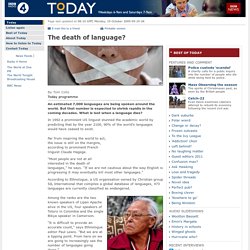

Understand what you read. 25 maps that explain the English language. English is the language of Shakespeare and the language of Chaucer.

It’s spoken in dozens of countries around the world, from the United States to a tiny island named Tristan da Cunha. It reflects the influences of centuries of international exchange, including conquest and colonization, from the Vikings through the 21st century. 25 maps that explain the English language. Map: Which languages are spoken at different tube stops? We probably don't need to tell you that London is a very diverse city.

At the time of the last census, 37 per cent of the population were foreign-born and over 250 langauages were spoken within city limits. For around 1.7 million Londoners, English is a second language. 5 examples of how the languages we speak can affect the way we think. Keith Chen (TED Talk: Could your language affect your ability to save money?)

Might be an economist, but he wants to talk about language. For instance, he points out, in Chinese, saying “this is my uncle” is not as straightforward as you might think. In Chinese, you have no choice but to encode more information about said uncle. The language requires that you denote the side the uncle is on, whether he’s related by marriage or birth and, if it’s your father’s brother, whether he’s older or younger. “All of this information is obligatory. This got Chen wondering: Is there a connection between language and how we think and behave? Lexicaldistanceielangs.jpg (JPEG Image, 841 × 601 pixels) Europe etymology maps 1. European and Asian languages traced back to single mother tongue. Languages spoken by billions of people across Europe and Asia are descended from an ancient tongue uttered in southern Europe at the end of the last ice age, according to research.

The claim, by scientists in Britain, points to a common origin for vocabularies as varied as English and Urdu, Japanese and Itelmen, a language spoken along the north-eastern edge of Russia. The ancestral language, spoken at least 15,000 years ago, gave rise to seven more that formed an ancient Eurasiatic "superfamily", the researchers say. These in turn split into languages now spoken all over Eurasia, from Portugal to Siberia.
10 Little-Known Delights of the English Language. The Arts The English language is wonderfully bizarre, and sometimes rather frightful.

It is a composite of the best and worst that ancient languages have to offer, and native speakers often take it for granted that they can speak it with the utmost fluency. English does have its fair share of problems, however – not least in lexical and semantic ambiguity. This list serves to shed some light on some of the quirks and idiosyncrasies which have made English one of the most widely discussed languages in the world. Example: The horse raced past the barn fell. How to build your vocabulary. Bilingual babies know their grammar by 7 months. Babies as young as seven months can distinguish between, and begin to learn, two languages with vastly different grammatical structures, according to new research from the University of British Columbia and Université Paris Descartes.

Published February 14 in the journal Nature Communications and presented at the 2013 Annual Meeting of the American Association for the Advancement of Science (AAAS) in Boston, the study shows that infants in bilingual environments use pitch and duration cues to discriminate between languages -- such as English and Japanese -- with opposite word orders. In English, a function word comes before a content word (the dog, his hat, with friends, for example) and the duration of the content word is longer, while in Japanese or Hindi, the order is reversed, and the pitch of the content word higher. "For example, in English the words 'the' and 'with' come up a lot more frequently than other words -- they're essentially learning by counting," says Gervain. Ancient languages reconstructed by computer program. Breakthrough in world's oldest undeciphered writing.
100 Most Common English Words Quiz. Death of 'thank you' Rather than failing to show gratitude, however, we are simply using other words.

In fact, one in three people say they usually use another word to express gratitude. Among the most popular phrases were the less formal “ta” and “cool” as well as the French word “merci”. Check out the BBC spelling in the tax story. No, really? Digital tools 'to save languages' Which new word would you add to the dictionary? Publisher Collins has announced that for the first time members of the public will be able to submit new words for possible inclusion in future editions of its dictionary. And yes, it has already taken delivery of "omnishambles", which made its original outing in The Thick of It, and was then used by Ed Miliband at PMQs this April. Original coinages are a long shot – all nominations will be assessed on usage – but Collins' editors aim to review words after a year, so you'll have a chance to popularise your invention.
The following are humbly submitted for approval: Amazebollocks. adj. Cautious, have-it-both-ways interjection that combines amazement with profound scepticism. G4S-tation. n. Dreckfest. n. Ausumn. n. Pre-cession. n. Wall Photos. News - A Point of View: Why euphemism is integral to modern warfare. 29 October 2011Last updated at 02:49.

The death of language? An estimated 7,000 languages are being spoken around the world.

But that number is expected to shrink rapidly in the coming decades. What is lost when a language dies?